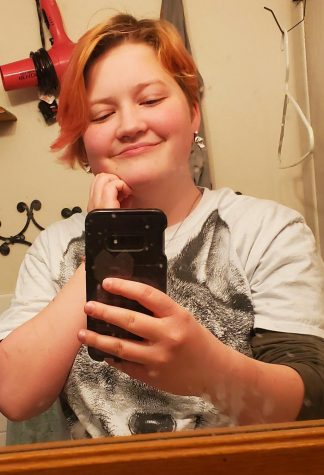According to Lily: J.K. Rowling and the Cruel World of Transphobia
September 26, 2020
J.K. Rowling is a name that pretty much any millennial or generation Z kid knows. It’s safe to say that most of us grew up with the Harry Potter books, sharing with friends about what Hogwarts house we were in and which character best exemplified ourselves within the story. Rowling became a name synonymous with joy and happiness and a positive aspect of childhood nostalgia. And for most people, this is still the same image in their minds. But that is most certainly not true for a number of people.
Quick content warning for talks of transphobia and transphobic language.
Recently, Rowling has come under fire on various social media sites, being centralized on Twitter, due to a number of transphobic comments made by the author.
On June 6, Rowling posted a tweet in response to an article published by devex.com. The article used the term “people who menstruate” as to be more inclusive for nonbinary and trans individuals who don’t identity as women but have periods. Rowling responded to this by stating “‘People who menstruate.’ I’m sure there used to be a word for those people. Someone help me out. Wumben? Wimpund? Woomund?”.
The author did this as a direct way of making the clear connect between menstruation and strictly women-identified people. She’s baiting the audience into viewing the articles phrasing as being offensive and demeaning to cis women (for any who don’t know, “cis” is a word meaning that someone identifies completely with their birth sex). To put it frankly, it is completely rude and discriminatory to these non-women people who do menstruate. The original article was literally just trying to be inclusive, why would you find something wrong in that?
Now, this is definitely not the first time that Rowling has been in somewhat hot water with a number of her fans, specifically BIPOC (black, indigenous, and people of color) and her LGBTQ+ readers. Since way back in 2007 when Rowling stated that the beloved character from Harry Potter, Albus Dumbledore was in fact gay. She’s had a history of “revising” her books, long after they’ve been published. I know this doesn’t seem like a truly horrible thing, but it’s important to note that these revisions, such as Dumbledore’s sexuality, are never seen nor discussed in the future iterations of the series (such as the recent Fantastic Beasts films), making the past addition seem like nothing more than a ploy to get more LGBTQ+ viewers/readers. Plenty of BIPOC have also pointed out some racist stereotypes with the Harry Potter series, such as the goblins being eerily familiar to anti-semetic characters and the only east Asian character’s name being Cho Chang, which, even to most white people, sounds ridiculous.
Rowling’s recent transphobia has just continued on after this initial incident. She wrote an essay of sorts about her ideas surrounding womanhood and trans folks’ impact on this. Throughout the essay, named “TERF Wars” (TERF being an acronym for trans exclusionary radical feminist), Rowling asserts that she does care about trans people, but, like a true hypocrite, she continues to discredit trans people and focus only on the negatives of transitioning and the trans community. She makes the classic TERF and transphobe argument of bringing up the “bathroom issue.” The bathroom issue is a debate over whether or not trans people should be allowed to use the bathroom that goes along with their gender identity, but not necessarily with their sex assigned at birth. Rowling uses the wording of “throw open the doors” and “any man who believes or feels he’s a woman” while speaking about this issue, an obvious usage of fear mongering.
In this essay, Rowling also discusses about detransitioning quite a lot. Detransitioning is a process in which a person will revert from transitioning back to their assigned gender at birth. This is not nearly as common as people like Rowling seem to think. Most people who medically transition don’t regret the decision wholly, even if some parts they do regret. The actual social and medical transition is rarely something that people reverse. According to a study done at the NHS Gender Identity Resource, reported by stonewall.org.uk, less than one percent of patients who had transitioned felt any regret or wanted to detransition.
Now that the recent controversies have been outlined, I think that people need to talk about how Rowling’s views and actions affect her books and our feelings towards them. To preface, I absolutely love the Harry Potter series. These books were like friends to me when I was at my loneliest, and they brought me comfort that not much media has. That being said, it’s hard to still enjoy it to this level knowing how hateful the author can be. I think that people can definitely still enjoy media from “canceled” and bad people. I think the biggest issue here is that if someone buys her books now, then they are giving her money and, in a way, enabling her behavior. I can’t decide for you if that’s something that you’re OK with, but I know that, personally, it’s the last thing I want to do. Rowling doesn’t need anymore people allowing her to speak this way .


